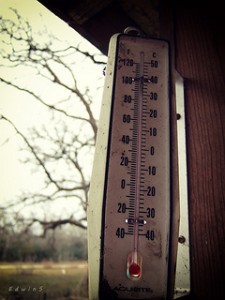How We Perceive the Weather
A new study looks at how ideological and political beliefs affect people’s perceptions of the weather. The authors surveyed 8,000 people across the U.S. between 2008 and 2011 and found that while floods and droughts were remembered correctly, temperature changes were a different story. From Ars Technica:
In fact, the actual trends in temperatures had nothing to do with how people perceived them. If you graphed the predictive power of people’s perceptions against the actual temperatures, the resulting line was flat—it showed no trend at all. In the statistical model, the actual weather had little impact on people’s perception of recent temperatures. Education continued to have a positive impact on whether they got it right, but its magnitude was dwarfed by the influences of political affiliation and cultural beliefs.
And those cultural affiliations had about the effect you’d expect. Individualists, who often object to environmental regulations as an infringement on their freedoms, tended to think the temperatures hadn’t gone up in their area, regardless of whether they had. Strong egalitarians, in contrast, tended to believe the temperatures had gone up.
The authors conclude that climate change has become perceived as a form of cultural affiliation for most people: their acceptance of it is mostly a way of reinforcing their ties to the political and ideological communities they belong to. And, since temperatures have become the primary thing the public associates with climate change, people now interpret the temperatures through a filter based on their affiliations, a process termed “cultural cognition.” In other words, we tend to interpret the temperatures in a way that reinforces our identity, and our connections with others who share similar political persuasions.
That’s what Dan Kahan and Ellen Peters of the Cultural Cognition Project told us in our podcast “The Truth Is Out There…Isn’t It?” In fact, Kahan and Peters have found that people who are more scientifically literate are better at collecting information that confirm their beliefs, and it happens because people want to fit in with friends and colleagues.
(HT: Scott Kominers)


Comments